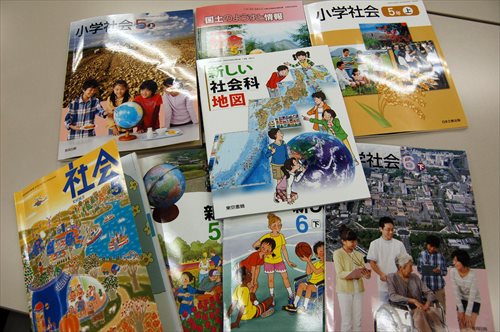Distorted tales confuse students
Young people alienated as Japanese textbooks move right

Textbooks for primary schools in Japan. Education authorities in Yokohama decided to promote history textbooks published by a right-wing publisher in public junior high schools in 2011. Photo: IC
More and more middle schools in Japan are adopting history books from right-wing publishers.
On Wednesday, the city of Yokohama decided to choose books edited by publishing house Ikuhosha for middle schools starting from 2016, the second time it did so since 2011.
In April, Japan's Ministry of Education, Culture, Sports, Science and Technology (MEXT) published the list of approved textbooks to be used in middle schools for the next year. The right-wing turn in the history books has many worried that young Japanese will become more alienated from their Asian neighbors as a result of receiving a distorted or incomplete historical education.
History books have been a major area of change, as a result that publishers complying with MEXT in order to get their publications approved as textbooks. A comparison of the two versions shows the changes.
In a history book published by Jiyusha, which used to flatly describe the Nanjing Massacre as "Japanese troops occupied Nanjing which resulted in substantial deaths," the new edition printed only "In December, Japanese troops occupied Nanjing." Manabisha's new textbook was ordered to completely delete the content about "comfort women."
Japan adopts a system that allows a range of versions of textbooks in the market for cities to choose from. The "board of education" in cities vote to pick the books for schools in its jurisdiction to use. Publishers can publish their own versions of textbooks as long as the books pass the assessment of the ministry.
In 2001, MEXT had ordered one of the conservative book publishers to correct 137 places in a history textbook that gave a distorted account of the war, beautifying Japanese actions.
Since taking office, the administration of Prime Minister Shinzo Abe has tightened control of education.
In January 2014, Japan approved the amendment to the editing criteria for textbooks, clearly requesting publishers to reflect the government's stance in the compilation of textbooks. Before the amendment, the textbooks editing criteria ordered publishers not to draw conclusions over disputed history events, however, the amendment allowed editors to "adopt government opinions and public consensus" when editing modern history.
As a result, the changing textbooks have tended to scale down the damage caused by Japan to Asian countries during the war and create more ambiguity for war responsibility, but have become clearer in asserting historical claims to disputed territory with neighboring countries.
Interview requests to MEXT and a number of textbook publishers were not accepted. Ikuhosha said it doesn't accept foreign media interviews, while MEXT said they wouldn't accept any interviews before the middle of August. Japan marks its unconditional surrender in WWII on August 15. Abe is expected to give a speech on August 14 this year.
Long-standing problem
Changes in textbooks have been a concern in Japan for years. The problem is that students can't get a broad picture of history from their history courses, said Professor Jeff Kingston, who teaches history in Temple University, Japan Campus.
He is concerned that "Japan's textbooks are more about fragmented facts, but not much moral judgement."
Therefore, Japan's textbooks have made young people less aware of history than they should, Kingston told the Global Times.
This was echoed by Utsunomiya Tokuichiro, vice president of the Japan-China Friendship Association (JCFA). He said the account of history from the Meiji Restoration until the end of WWII in Japan's history textbooks was incomplete. The lack of references, and even omission of China-related history, including the Manchuria invasion and the Nanjing Massacre, have left the young people in Japan without adequate knowledge of their neighbor.
Critics are concerned that the manipulation of textbook editing by the Abe administration will have further impact on the younger generation.
Kingston said that, unaware of the war responsibility of Japan as a result of the government's intentional concealment of historical facts, young people ask, "Why are they always angry, why do they always criticize us?"
In the face of an increasingly conservative younger generation, the JCFA hosts various events to bring young people from Japan and China together, so as to create opportunities for mutual understanding and compensate for the missing part in textbooks, said Tokuichiro.
Conservative publishing
Popular books and other publications about history in Japan also tend to be conservative.
A visit to Tokyo's bookstores shows that how right-wing publications have become mainstream. The history bookshelves in large bookstores are dominated by right-wing publications. Many books claim to have new proof of the true story of history rather than the officially recognized account. Books that question the Tokyo Trials results and the suffering of "comfort women" are conspicuous. Even in hotel rooms, such history books are distributed free with both Japanese and English versions.
Sharing the bookshelves with right-wing publications are many books that depict China as a global threat and which forecast the collapse of China. This is no surprise when compared with the increasing dislike of China in public surveys. Recent surveys put the figure at above 80 percent.
Kingston believes that it's part of the Abe administration's imposed reactionary nationalism to encourage anti-China and anti-Korea sentiment. As China rises and is depicted as a regional hegemony, Japan looks to deterrence as an answer to a more powerful neighbor.
The high dislike ratings are partly a result of media practice, as when bilateral ties deteriorate, the media tend to exaggerate the responsibility of the other side, said Tokuichiro.
When books that say good things about China lose their market, it consolidates the public impression of a bad neighbor.
However, at least the large amount of books about China shows that people feel the need to pay attention to the neighbor, he added.